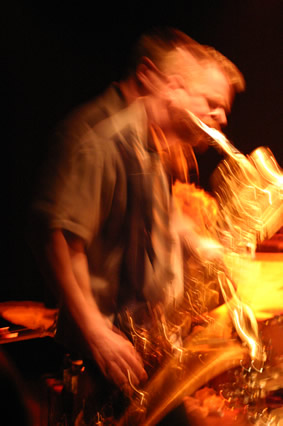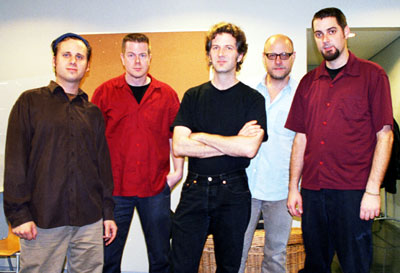
The Vandermark 5, AMR, Ginebra, Suiza
©Juan Carlos Hernández, 2004
José Francisco Tapiz - Tomajazz: Can you tell
us what are we going to listen in your visit to Spain with FME?
(Free Music Ensemble)
Ken Vandermark: FME will be performing material from
our new album, underground (which is coming out on Okka disk at
the start of may), as well as some new material which we will
work on during the tour in Europe in order to prepare for a recording
session this fall in Scandinavia. The music is designed around
the idea of how a trio can deal with "time and groove,"
but in a fluid way (i.e. not tied to a specific meter like 4/4
time, etc.); in addition, the compositions are modular. Each piece
as 3 tracks of information (melodic lead, secondary melodic line,
and rhythmic material). These elements can be shifted from performance
to performance, and the sequence of material is also flexible
so each set is created specifically for each concert. Much of
the decisions about moving through the forms are improvised.
José Francisco Tapiz - Tomajazz: Please, introduce
us the musicians of FME.
Ken Vandermark: The band features Nate
McBride on bass, Paal Nilssen-Love on drums and myself. Nate has
worked with me most frequently in Spaceways Inc. And Tripleplay.
Paal and I have worked together in School Days, our duo together,
the octet Atomic/School Days, and in the Territory Band. So there's
a lot of history among the three of us. This group has toured
in Scandinavia, and this past December in North America. The new
album was recorded in Chicago at the end of the that trip.

©Nuno Martins, 2003
José Francisco Tapiz - Tomajazz: In jazz there’s
a main concept: the tradition. What means tradition for you? Who
are the musicians that are in “your” tradition?
Ken Vandermark: I find it curious that
there's so much discussion of "tradition" when it comes
to jazz/improvised music. It always seems like there are people
who feel the need to protect the music somehow (I’m not
suggesting that you're one of these people José!). Why?
To me, there are so many music "traditions" that affect
the work I’m doing, the preoccupation with what is/isn't
jazz, what fits/doesn't fit into the cannon seems like a very
narrow view of what is involved when it comes to the music. And
this is without even taking into account other art forms!
For me, the "tradition" I subscribe to is the tradition
of individual creative thinkers who choose to work together, whether
in improvised music or other fields. If we keep the discussion
to jazz, I hear and see a direct continuum from Louis Armstrong,
to Duke Ellington, to Thelonious Monk, to Charlie Parker, to John
Coltrane, to Ornette Coleman, to Albert Ayler, to Don Cherry,
to Peter Brötzmann, to Evan Parker, to Derek Bailey, to Mats
Gustafsson, to Ab Baars... The line isn't always straight and
it includes many, many players, some of whom probably wouldn't
consider themselves as "jazz musicians;" but that's
the tradition I think of when I think about this music.
José Francisco Tapiz - Tomajazz: You are involved
in multiple projects at the same time. How do you manage to make
those projects work out?
Ken Vandermark: I find that all the
different threads of work that I do affect and inspire each other.
Recently I’ve done some new work with the Peter Brötzmann
Chicago Tentet in the Southeast of the United States. Playing
with that ensemble is quite different than playing with The Vandermark
5, or FME, etc but the musical thinking that goes on between the
players influences each project, the ideas cross pollinate. As
long as I remain clear and focused on what each group is "about,"
it's possible to take these different sets of ideas and apply
what's most crucial to make new music work for each band. The
biggest challenge is scheduling, and getting all of these musicians
in the same room together at the right time!
José Francisco Tapiz - Tomajazz: You have paid
tribute to many musicians with your projects. Don Cherry (DKV),
FMP / EME (FME), Kirk, Rollins and some of the most important
figures of free-jazz as Taylor, AEOC, Bley or Hemphill (The Vandermark
5), Jimmy Giuffre Trio (Free Fall), Sun Ra / Funkadelik (Spaceways
Incorporated)... Who will be the next musician?
Ken Vandermark: The most recent investigation
into another musician's work has been with the Vandermark 5. We
recorded 11 compositions by Roland Kirk arranged for the band
to be included as the bonus disk with our new album, Elements
Of Style / Exercises In Surprise. It was pretty incredible to
perform that material. I'm hoping that that disk and the Rollins
material we did for Airports For Light will be released as a double
cd this fall, much like the Free Jazz Classics Vol. 1 & 2.

The Vandermark 5
© Sergio Merino, 2003
José Francisco Tapiz - Tomajazz: Atavistic will
release soon the new Vandermark Five record. In this recordings
I can see some changes and an important evolution in the musical
concepts. In which direction this group is moving on?
Ken Vandermark: In some ways I consider
the Vandermark 5 to be my "workshop". It's where I try
to find out how different ideas I have may or may not work. Luckily
we have many chances to play, either at home in Chicago or on
the road, so it's possible to develop the ideas more quickly in
this ensemble than with many of the other projects I’m working
on. In march the V5 were in Krakow, Poland, playing 5 nights of
concerts at a club. While we were there I had the time to compose
3 new pieces for the band- we could play them every night and
develop them while in Krakow, and then as we moved on further
during the tour. It's been a very unique opportunity to work with
Jeb Bishop, Tim Daisy, Dave Rempis, and Kent Kessler for so many
years. The players "know" much of what I am trying to
get at with the new pieces without my having to explain each detail.
This speeds up the process of getting "off the page"
and into the music.
Right now I am trying to find a way to move the idea of pulse
outside of the brackets and patterns normally associated with
"jazz," in order to still groove hard but with more
open parameters. I'm also trying to move past examining certain
stylistic concerns and perform music that's more "my own",
that integrates all the kinds styles that I’m interested
in organically. Hopefully this will lead to some new hybrids of
what can be done with a band playing improvised music today.
Clean Feed has just released a new Tripleplay record called
Gambit. I know the term “Gambit” in chess. To whom
are you trying to take advantage? What sacrifice are you doing
for this? What’s the meaning of the title of this record?
Ken Vandermark: Originally i liked the
word itself. The more that i considered it in relation to the
album, the process of making the recording, and the process of
playing this music it seemed like an ideal name for what we're
doing. It's a risk to try to create something meaningful on the
spot, each night. It's a risk to be away from home on tour, sacrificing
time with people who are close and important to you. It's a risk
to play music that doesn't fit into narrow stylistic parameters
that are used to catagorize music. The players i work with take
these chances all the time in an attempt to discover what's possible-
the sacrificial action is sometimes necessary to move forward.
Some years ago you received the McArthur Genius Grant.
How many records have you released with the money of this prestigious
prize?
Ken Vandermark: Most of the funds have
gone towards the large group projects: putting the peter brotzmann
chicago tentet on the road in north america in 2000 and 2002,
plus recording the band at the end of those tours; also organizing
and recording the territory band projects. In smaller ways, i've
used the funds to help pay for motel rooms and other expenses
while bands are touring. The economic leeway the prize has given
me has mostly allowed me to take chances on projects that i would
have otherwise thought impossible. What i've learned is that almost
anything is possible, it's just necessary to plan correctly and
to learn from each situation.

